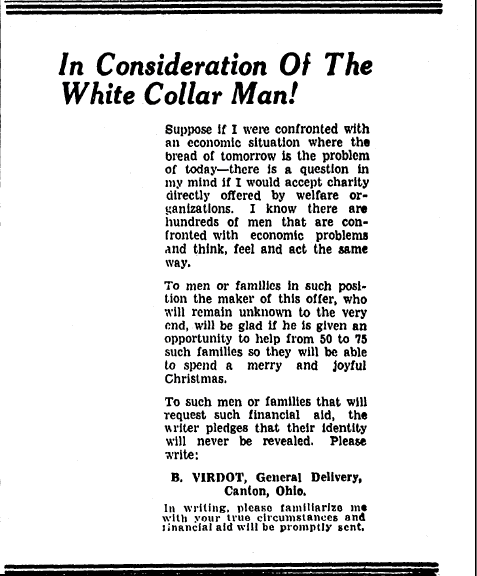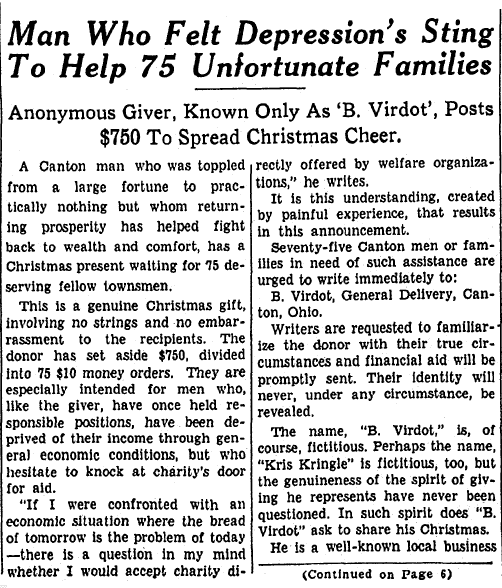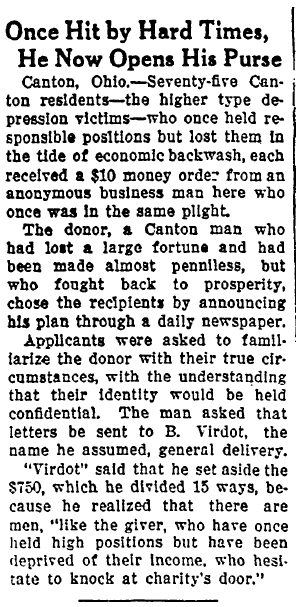Introduction: In this article, Gena Philibert-Ortega searches old newspapers to learn more about a wonderful Christmas story from the midst of the Great Depression: one man in Canton, Ohio, decided to do something to help his struggling neighbors that Christmas. And he did it anonymously. Gena is a genealogist and author of the book “From the Family Kitchen.”
There’s no doubt the sting of the Great Depression years was felt by families of all socio-economic levels in the United States. The severe economic downturn was a great equalizer and affected everyone – from the formerly well-off, country club member business man to the common laborer. That pain of crushing poverty would have felt even harsher during the holidays.
In 1933 one man in Canton, Ohio, decided to do something to help his neighbors at Christmas. Secretly under an assumed name, this man placed a newspaper ad, opened a bank account with $750, and proceeded to give away this money to those in need. While many families after the fact wrote letters thanking him, it wasn’t until 70 years later that the identity of this mysterious “Secret Santa” and the full impact of his generosity were uncovered through family history research.
The Christmas Gift
A week prior to Christmas, on 18 December 1933 in the Canton Ohio Repository, an advertisement was published titled “In Consideration of the White Collar Man” that invites those having financial difficulties to receive a check by sending a letter to B. Virdot, General Delivery, providing information about their circumstances.

That newspaper advertisement was not the only mention of this holiday gift in the paper that day. On the front page, a story about B. Virdot provides more information about the advertisement which ran only that one day. It begins:
A Canton man who was toppled from a large fortune to practically nothing but whom returning prosperity has helped fight back to wealth and comfort, has a Christmas present waiting for 75 deserving fellow townsmen.
The old news article continues on to say that this Christmas gift is one with no “strings, no embarrassment,” $10 to 75 families in need.* The holiday gift is meant for “men, like the giver, have once held responsible positions, have been deprived of their income through general economic conditions, but who hesitate to knock at charity’s door for aid.” The historical news article explains that the name “B. Virdot” is fictitious but the donor is a local businessman who has known financial difficulties and, with the help of others, has recovered and now wants to share that gift with others.

News of this Christmas gift was carried in other newspapers, with coverage continuing well after the fact. For example, in the early part of 1934 notice of B. Virdot’s generosity was printed in this Pennsylvania newspaper.

The Family History
Normally, the touching Christmas story would end there: impoverished families receive generous gift from anonymous donor. What more could be said, in a case like that with no real name to track down? Letters written requesting assistance are ephemeral, and easily thrown away once read.
Fast forward 70 years when Ted Gup, a writer and newspaper reporter, was given a suitcase by his mother. The suitcase, belonging to his maternal grandfather, held family history documents that were of interest to Gup. But once opened, he also found letters from 1933, written by 150 people whose surnames he recognized as coming from his hometown of Canton, Ohio, and all addressed to B. Virdot – a name unknown to him.** Why did his grandfather have these letters?
Through research and talking with his mother, Gup learned the magnitude of those letters. The true identity and miraculous secret kept all those years was that “B. Virdot” was his grandfather, Sam Stone, a Jewish Romanian immigrant who knew all too well about hardship. Amazingly, his selfless act not only helped people he didn’t know but also helped once-wealthy businessmen who were his acquaintances – but they never knew the identity of their benefactor.
Gup’s book, A Secret Gift: How One Man’s Kindness – and a Trove of Letters – Revealed the Hidden History of the Great Depression (2011), tells the story of not only his own family but also the present-day families of those helped by the B. Virdot checks. The research used to piece together these stories includes methods familiar to family historians: oral interviews, vital records, land records, and of course newspapers.
Another Lasting Legacy
Often when we research family history its impact is felt by us and those family members that we share it with. One of the big lessons of the story of B. Virdot/Sam Stone and the research done by his grandson is that it’s a mistake to not take into consideration our ancestor’s community. Friends, neighbors and acquaintances all had an impact on their lives. Ted Gup, by following up with the descendants of those check recipients, many of whom knew nothing about that aspect of their ancestor’s life, also gave back something important to those families, as his grandfather had done 70 years ago. He gave them the story of an event in the family’s life. By providing them the information from the letter, written in their ancestor’s own words, and the research of what happened after the gift, those families received something much more valuable.
You can read more about Ted Gup’s book at his website A Secret Gift. Copies of some of the letters can be found on the website. The letters and Gup’s research were donated to the Stark County Historical Society at the William McKinley Presidential Library in Canton. A list of the letter writers can be found on their Curator’s Corner blog.
Related Articles:
- Family History Fact Finding: True Family Stories in Newspapers
- Filling In My Family Tree with Stories in Old Newspapers
- 3 True-Life Love Stories to Brighten Your Valentine’s Day
—————-
* Originally the checks were to be $10 to 75 families, but because of the demonstrated need, 150 families received a $5 check which still was generous for the time.
** Gup’s book explains that the letters in the suitcase represent everyone who received a check. It is not known if there were other letters from people who were not chosen to receive a check.
